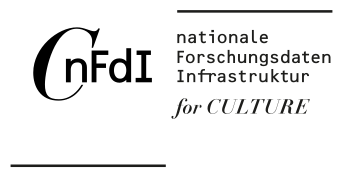
NFDI4Culture – Consortium for research data on material and immaterial cultural heritage
- Funding:
Deutsche Forschungsgemeinschaft (DFG) – 441958017
The NFDI4Culture consortium focuses on making very heterogeneous data from the entire field of culture and the related humanities retrievable and accessible across all disciplines and on continuously maintaining and preserving them in the long term. This includes 2D digital reproductions of paintings, photographs and drawings as well as digital 3D models of culturally and historically important buildings, monuments or audiovisual data of music, film and stage performances. Up to now, there has been no coordinated effort on a national level to secure, standardize and make available research data from the cultural heritage on a sustainable basis. NFDI4Culture aims to fill this gap.
Digital data on tangible and intangible cultural assets is an essential part of daily life, communication and cultural experience. It has a lasting influence on the perception of cultural identity and generates important interaction between research, cultural economy and society. Throughout the last three decades, many cultural heritage institutions have contributed to a wealth of digital representations of cultural assets (2D digital reproductions of paintings or sheet music; 3D digital models of sculptures, monuments, rooms, buildings), audio-visual data (music, film, stage performances), and procedural research data such as encoding and annotation formats. The long-term preservation and FAIR availability of research data from the cultural heritage domain is fundamentally important, not only for future academic success in the humanities but also for the cultural self-understanding of individuals and society as a whole. Up to now, no coordinated effort for professional research data management in this scientific domain on a national level exists. NFDI4Culture aims to create a user-centered, research-driven infrastructure that will cover a broad range of research domains from musicology, art history and architecture to performance, theatre, film, and media studies.
For this purpose, partners from research, memory institutions, scientific associations and infrastructure institutions of various federal, state, municipal and private sector bodies have come together. For the first time, efforts are made to unite them in a federated infrastructure that optimally meets the needs of the parties involved. To this end, NFDI4Culture receives support from numerous researchers and international cultural heritage organizations such as the UNESCO, the International Council of Museums, Open Knowledge Foundation and Wikimedia.
The consortium
NFDI4Culture consists of a network of nine co-applicants and 52 participating institutions. These include four German universities (Cologne, Heidelberg, Marburg, Paderborn), three infrastructure institutions (FIZ Karlsruhe, TIB Hannover, SLUB Dresden), the largest German institution in the GLAM domain (GLAM = Galleries, Libraries, Archives and Museums), Stiftung Preußischer Kulturbesitz and the Academy of Science and Literature, Mainz. Other members are 11 scientific associations each of which represents one of the research areas of the consortium. NFDI4Culture is coordinated by the Academy of Science and Literature. The research activities of the consortium comprise six task areas.
NFDI4Culture is funded by the German Research Foundation (DFG) – 441958017
FIZ Karlsruhe@NFDI4Culture
FIZ Karlsruhe contributes to task area 5 : “Overarching technical, ethical and legal activities“ with the technical and legal expertise of its research units Information Service Engineering (ISE) and Intellectual property rights (IGR). For research data from the disciplines of NFDI4Culture not only pose major technical and methodological challenges. The often complex and dynamic legal situations of the researched content, too, have an impact on the scientific handling of tangible and intangible cultural assets and the digital data generated in the process.
Therefore, efficient common authentication and access solutions (AAI) will be developed within the scope of task area 5. These solutions will enable digital research while ensuring legal certainty, e.g., with regard to data protection regulations. A comprehensive information portal will provide a single point of access to the consortium for users and link the information resources of NFDI4Culture with international infrastructures such as OpenAIRE and EOSC. Modelling and implementing a platform for linked (open) data is the basis for this. Comprehensively structured data in the form of a knowledge graph and a terminology service thus ensure the connectivity, findability, accessibility, interoperability and reusability of NFDI4Culture information resources – while at the same time making them curatable by the users participating in the consortium.
Researchers can also obtain regular advice in order to create legal certainty for providers and users with regard to existing legislation (Legal Helpdesk). In addition, the experiences and requirements of stakeholders are collected and passed on to the legislators to advise them on the development of adequate legislation (stakeholder process to improve legal certainty).
FIZ Karlsruhe also contributes the expertise of its e-Research unit to task area 4 “Data publication and data availability”. The focus is on providing referential implementations for repositories and publishing platforms, digital preservation (in particular of 3D data), and offering advice to the community. For this purpose, the generic repository RADAR will become part of the projected infrastructure and be adapted to the specific requirements of the disciplines covered by NFDI4Culture.
